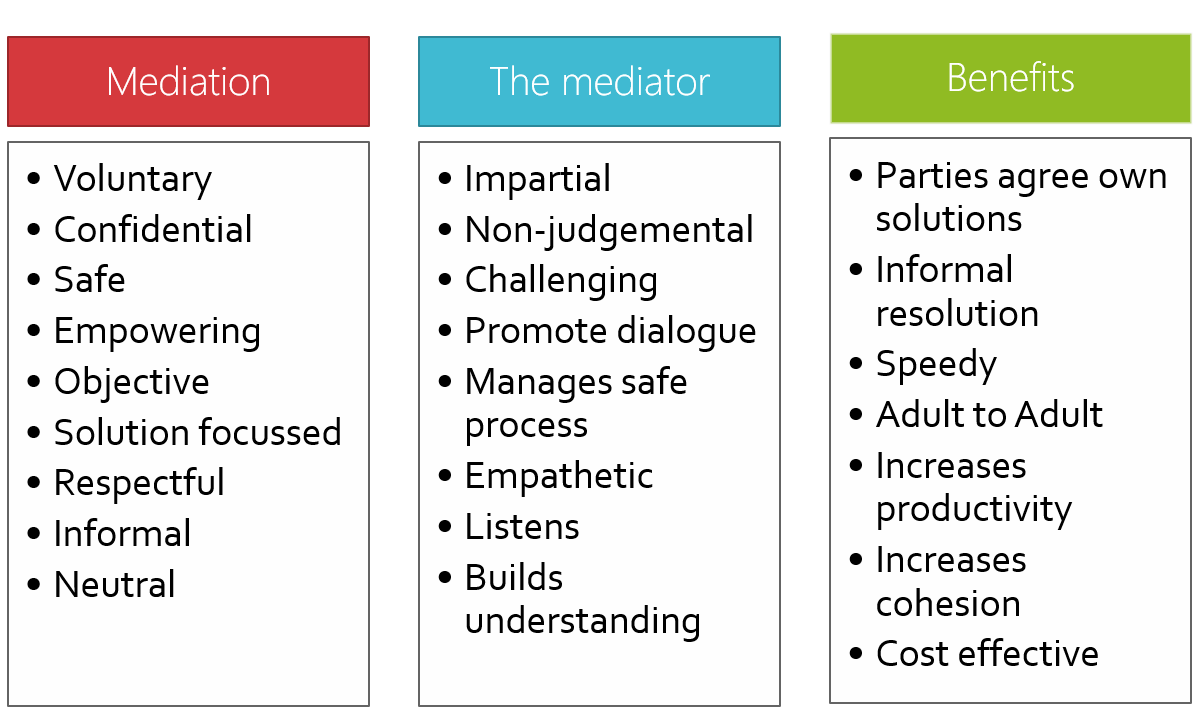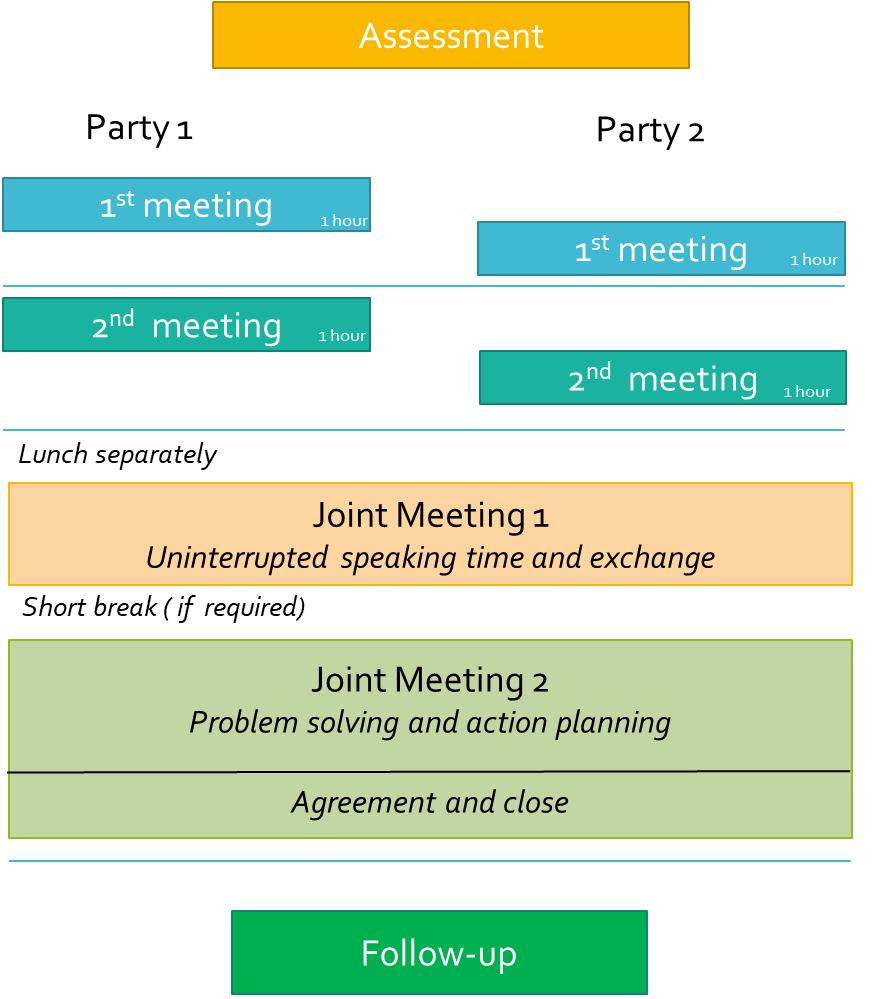What is mediation?
Mediation is a structured process, facilitated by the Ombud, designed to allow dialogue, empathy, mutual respect, ideas and trust to flow again between colleagues in a conflictual situation.
This may happen, in the safe environment hosted by the Ombud, when the two parties get out of their entrenched positions and start to recognize their mutual positions.
Mediation is voluntary .i.e. the two parties must be willing, in good faith, to try mediation. The process - and its outcome - are confidential between the parties and the Ombud. It is informal, so no records are kept and it does not trigger any formal process.
Conducted in the Ombud's office, the process will allow parties to express their own views of a situation, the impact it has on them, their needs and their goals for a successful conflict resolution. The key of the mediation process is that the parties themselves will explore solutions and decide on the way to move forward, past the conflict.
The Ombud, in the role of mediator, will ensure that the process is voluntary, confidential, impartial, non judgmental and remains self determined by the parties.
In a successful mediation, the parties come to an agreement of practical actions both can take to restore a fruitful work relationship.
Here are, in a nutshell, the principles and benefits of mediation, as well as the role of the mediator.

How does mediation work?
Very simply. If you would like to try mediation to resolve a conflict, or if you would like to address a within your team, contact the Ombud. With your permission, the Ombud will contact the other parties and propose a mediation facilitated by the ombud. In some cases, the two parties are referred to the Ombud by a supervisor, a project leader or by HR. In this case, the Ombud will check that the two parties understand what mediation is and are willing to try it, voluntarily and in good faith. If this is not the case, mediation is not possible.
Once the two parties have had an opportunity to ask all their questions about the process and have agreed to mediation, the Ombud will make appointments with them for a series of meetings.
All meetings take place in the Ombud's office, which offers a safe and comfortable environment and where all voices have equal value, independently from the hierarchical or other positions of power imbalance.
Two individual one hour meetings with each of the party, separately. This is where each party will tell the story of the conflict, the impact it has on them and what they need to move forward.
Then, ideally on the same day, a joint meeting with the two parties which will take most part of a work day's afternoon. Each party will be given uninterrupted speaking time to express themselves. The Ombud is the guarantor of the fairness of the process and will ensure that discussions are respectful and courteous.
Once feelings and emotions have vented and common goals are expressed, the parties will explore practical solutions to the conflict, one step after the other. The Ombud will draw the agreement that the two parties have themselves built and agreed upon, The agreement belongs to the parties and to them only.
In the case where the parties have been referred to by a manager, project leader or HR, the Ombud will only report that the mediation was successful , or not. The agreement will not be shared with the referrer unless the two parties agree to.

Frequently Asked Questions
What are the advantages of mediation over a formal grievance?
Formal processes such as a formal complaint, are by nature, adversarial and lead to win/loose situation. They do not identify the root cause of the conflict, tend to polarize the parties and do not repair the relationship between the two parties. In addition, formal grievance procedures are lengthy processes which take a lot of energy and emotions from all parties. This energy and the time involved should not be underestimated. Conversely, a successful mediation process leads to a win/win agreement where the relationship between the two parties stand a chance to repair and even improve.
Why should I try mediation?
Mediation is a unique opportunity to resolve a conflict and move forward. Conflicts take up a lot of energy from all parties, resolving a conflict will liberate this energy for other purposes, whether in your personal life or in the work place.
The Ombud, acting as the mediator, creates for you a safe space where dialogue is allowed to flow again . You and the other party stay in control and nothing further happens that you two will not have agreed. You have nothing to loose in trying mediation with the Ombud.
How long does mediation take?
The structured mediation process takes the best part of a day, and you would have to make time for it.
Is mediation sometimes not appropriate?
Mediation is a voluntary process that is self determined by the parties. So in the case where a party does not engage in mediation in good faith, or a with a hidden agenda, mediation will inevitably fail and may further damage the relationship between the parties. After talking to both parties, the Ombud will decide whether or not mediation is appropriate.
Can the same conflict/issue be the subject of mediation several times?
No, mediation is offered as a unique opportunity to solve a specific conflict and move forward. The agreement which both parties reach at the end of the process also includes a clause on what the parties have agreed to do, should the issue resurface. The mediator also proposes a follow up call/email 3,6 and 12 months after mediation. It is an opportunity for both parties to share with the mediator how the relationship is doing and explore how to handle specific concerns.
What is the success rate of mediation?
Mediation, with the FAIR process, is successful in 90% of cases ( Source the TCM Group )
Can my supervisor or anyone else impose mediation?
No, your supervisor cannot impose mediation, nor can anyone. He/she may invite you to try it as an opportunity to move forward from a conflictual situation which is often also expanding beyond the two parties and damaging team work. But you need to enter voluntarily into mediation.
Is mediation possible if more than two parties are engaged in a conflict?
Yes, it is the same process with individual meetings with each party involved in the conflict. Depending on the number of parties involved, the mediation might take longer than a day.
Is co-mediation possible?
Yes it is. Depending on the number of parties involved , and if it is a wish of both parties, or if the Ombud considers co-mediation as an additional success factor, two mediators can facilitate the process.
In all cases, the possibility to co-mediate and the choice of the co-mediator will be discussed and agreed with the parties beforehand.
Any question on mediation left unanswered? Contact the Ombud at ombud@cern.ch
